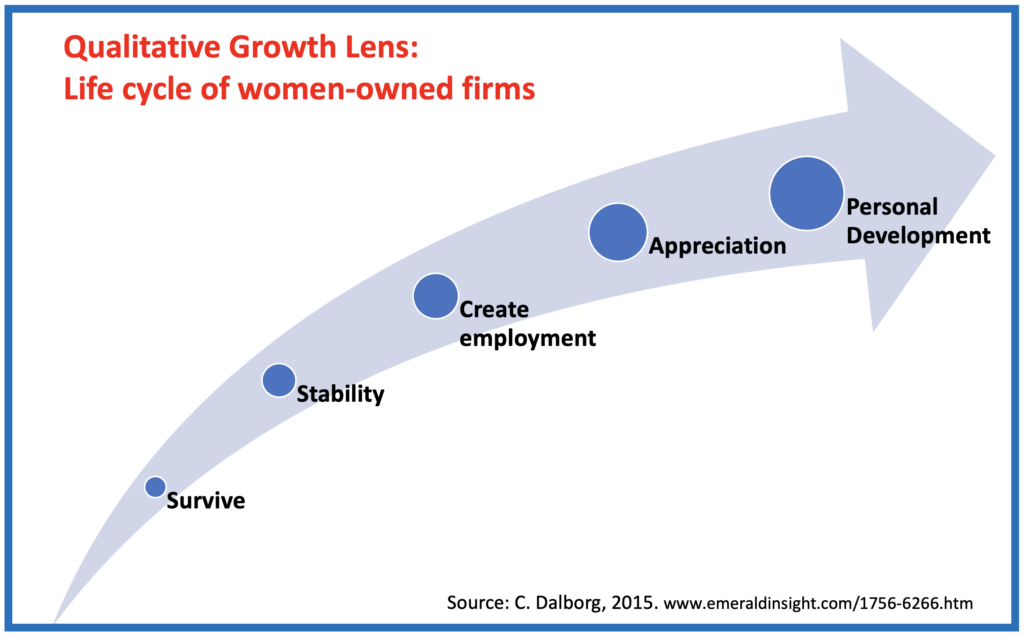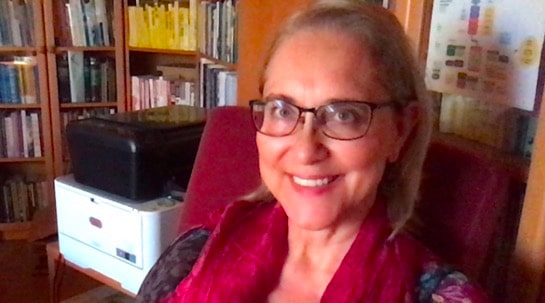Enterprise Development
WEI’s work on catalyzing enterprise development and entrepreneurship for micro, small, and medium enterprises covers a range of activities, including:
- Support for women-owned/-led enterprises from concept/start-up to operation and scaling up for impact,
- Initiatives designed to foster a favorable entrepreneurship ecosystem for women’s enterprise and innovation.
The challenges and needs experienced by women entrepreneurs change as their businesses evolve, so WEI has adopted a life-cycle approach to supporting women entrepreneurs.

Women entrepreneurs in the formal and informal economy are concentrated in the survival stage due to limitations imposed by family responsibilities, differential access to education, finance, markets, and business networks. As a result, they operate predominantly in low-value, consumer goods, and services sectors with limited potential or opportunities to grow and scale their businesses.
In addition, this integrative approach addresses the needs of special populations (e.g., immigrant, neuro-diverse, and youth entrepreneurs) and includes market segments such as ‘family businesses’ with a focus on the roles of women in family-owned businesses.
Strategic areas of focus
- Fostering an enterprise culture: WEI works to support initiatives designed to foster enterprise skills for girls and boys, ideally through the educational system. WEI aims to enhance their understanding of and exposure to formal entrepreneurship by working with teachers and schools.
- Developing enterprising competencies: WEI recognizes that developing enterprise skills in young adults offers them the tools and options engage in entrepreneurial activities. WEI works with key stakeholders and education providers to build enterprise competencies in young people in order to expand their knowledge and understanding of options for building enterprises. WEI’s goal is to help empower and facilitate economic independence in these target groups.
- Promoting the economic empowerment of certain disenfranchised and marginalized groups: WEI recognizes that marginalized groups can benefit from enterprise development training and support. For example, entrepreneurship may be an avenue for empowering:
- neuro-diverse women who find it difficult to adjust to the corporate world;
- young graduates who may need to develop enterprise competencies;
- individuals in transition due to redundancies;
- women re-entering the work force after exiting to provide family caregiving; and
- migrants and refugees.
WEI’s goal is to facilitate economic opportunities for these groups.
- Providing expertise and technical assistance to strengthen business ecosystems and enabling environments for women micro and small entrepreneurs: Robust business enabling environments and entrepreneurship eco-systems are critical for competitive and thriving entrepreneurship. The overwhelming evidence shows that a level playing field is essential for competition and facilitates greater inclusivity for domestic and minority entrepreneurs, including women-owned/women-led enterprises.
WEI’s CEO, network of specialists, and technical partners have worked extensively on competitiveness, business environment, legal and regulatory reforms across more than 75 developed, transition, and developing economies at national and sub-national levels over the past 30 years.
This combined knowledge, proven technical competencies, and extensive practical experience constitutes a strong foundation and sustains rigor in guiding the work of current WEI associates on women’s entrepreneurship, gender impact assessments, and advisory services designed to facilitate women’s entrepreneurship.

Dinah Bennett
Co-Lead, Enterprise Development
Dinah Bennett has been a leader of women’s economic empowerment for over 25 years. In the UK she initiated a best practice initiative for supporting women’s entrepreneurship based on the concept of developing and growing social capital. She was awarded OBE in 2010 and holds the Queen’s Award for Enterprise Promotion.
As the founder of International Consultants for Enterprise Entrepreneurship (ICE), Dinah designs and delivers entrepreneurial development programs all around the world. ICE’s aim, to help institutions and individuals understand the small business community in order to introduce effective enterprise strategies and polices.

Yolanda Gibb
Co-Lead, Enterprise Development
Yolanda Gibb has over 30 years of experience working with individuals, educational institutions, members of the business support ecosystem, policymakers and international institutions. Her work and research interests primarily revolve around fostering entrepreneurship, internationalization, leveraging intangible assets in companies and regions and improving the investment climate.
Ms. Gibb has designed and delivered programs to facilitate women’s paths into enterprise and taken an active role in the management of local networks and associations for women entrepreneurs and professionals.
